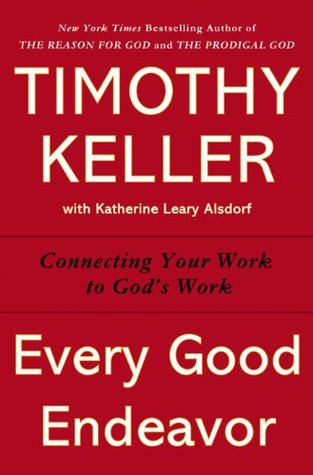More on this book
Community
Kindle Notes & Highlights
Read between
March 9 - April 24, 2023
Theological and ethical reflection on our field of work is not easy. It is easier by far to focus on your own job and merely seek to work with personal integrity, skill, and a joyful heart. That is indeed a major part of what it means for a Christian to do faithful work, but that is not all it takes. Christians are to think persistently and deeply about the shape of work in their field and whether (in biblical terms) it accords as well as possible with human well-being and with justice.206
the gospel replaces the story that animates our work, it alters our conception of what work is, and it reorients the ethical compass we use for work. In addition to all this, the gospel also gives us new power for work by supplying us with a new passion and a deeper kind of rest.
“Acedia is the sin which believes in nothing, cares for nothing, enjoys nothing, loves nothing, hates nothing, finds purpose in nothing, lives for nothing and only remains alive because there is nothing for which it will die.
Without something bigger than yourself to work for, then all of your work energy is actually fueled by one of the other six deadly sins. You may work exceptionally hard because of envy to get ahead of somebody, or because of pride to prove yourself, or because of greed or even gluttony for pleasure. In short, acedia is the most subtle idolatry of all. It puts the cynical self at the center of your life. And when you do that you release all the worst vices and sins to be the main animating energies behind your work.
“I urge you, brothers and sisters, in view of God’s mercy, to offer your bodies as living sacrifice” (Romans 12:1).
To say to God’s people, “I want you to be a living slain thing,” is meant to be a jolt; it’s a way of saying you have to continually be in the rhythm of dying to your own interest and living for God. That’s the passion God asks of you.
What is it about God’s mercy that, if you viewed it, would allow you to become a living sacrifice—into a person who died to your own needs, who stopped doing the work under the work, and who transferred your passion to God?
You are justified in God’s sight, so you have nothing to prove. You have been saved through a dying sacrifice, so you are free to be a living one. You are loved ceaselessly, so you can work tirelessly in response to a quiet inner fullness.
Since God rested after his creation, we must also rest after ours.
We are also to think of Sabbath as an act of trust. God appointed the Sabbath to remind us that he is working and resting. To practice Sabbath is a disciplined and faithful way to remember that you are not the one who keeps the world running, who provides for your family, not even the one who keeps your work projects moving forward.
How easy to fall prey to the temptation to believe that they alone are holding up their corner of creation!
The yoke or harness put on a beast of burden was a symbol of slavery and grinding toil. How could this be a solution to the problem of deep weariness? Jesus says that it is his yoke and burden—and it is the only one that is light. Why? “For I am gentle and humble in heart, and you will find rest for your souls” (verse 29). He is the only boss who will not drive you into the ground, the only audience that does not need your best performance in order to be satisfied with you. Why is this? Because his work for you is finished.
a Christian is able to rest only because God’s redemptive work is likewise finished in Christ. When the work under the work has been satisfied by the Son, all that’s left for us to do is to serve the work we’ve been given by the Father.
As C.S. Lewis observed, You will never make a good impression on other people until you stop thinking about what sort of impression you are making.
“Nunc dimittis.” These are Simeon’s words in Luke 2 after he had seen the promised Messiah. They mean, essentially, “I could die happy now.”
Abraham Kuyper, “There is not a square inch in the whole domain of our human existence over which Christ, who is Sovereign over all, does not cry: ‘Mine!’”
Individual salvation The gospel changes everything (hearts, community, and world) 2. Being good Being saved 3. Cheap grace Costly grace (awareness of our sin) 4. Heaven is “up there” Christ will come again—to this earth 5. God is value-add to us In God’s providence, we could contribute to his work on earth 6. Idols of this world Living for God 7. Disdain of this world Engaged in this world 8. “Bowling alone” Accepting community 9. People matter Institutions matter 10. Christian superiority God can work through whomever he wants (common grace)


